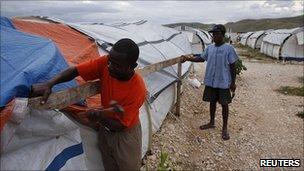Fatal floods as Hurricane Tomas sweeps over Haiti
- Published
Survivors of Haiti's earthquake in January have been enduring torrential rain and flooding caused by Hurricane Tomas and there are concerns that the cholera outbreak could spread.
Heavy rain from Hurricane Tomas has battered western Haiti, causing floods which have killed at least four people.
The eye of the storm clipped the island with winds of 140km/h (85mph). Up to 25cm of rain was forecast.
There is a danger of mudslides and further flooding, which could worsen the current cholera epidemic affecting parts of the country.
But the storm appeared to have spared the hundreds of thousands of people who rode it out in flimsy tent camps.
The BBC's Laura Trevelyan, in Haiti, said many people have already spent one miserable, windy, muddy night in exposed conditions.
The government had urged those living in tented homes to find better shelter, but many said they had nowhere to go.
Our correspondent says that the storm has underlined the fact that nearly a year after Haiti's devastating earthquake, more than 1.3m people are still living in makeshift canvas homes.
Cholera fears
Rains continued off and on for hours after the storm moved on to Cuba.
And there were fears that the death toll could rise once isolated areas of the country were reached.
On Friday evening, the southern town of Leogane was completely under water three metres (10 feet) deep in places, civil defence official Philippe Joseph was quoted by the AFP news agency as saying.

Haiti's tented refugee camps escaped the worst effects of the storm
"We are going to have more victims because of the floods and mudslides, but we cannot yet reach the communities most affected," the official said.
In the city of Port-au-Prince, Haitians were up to their ankles in water in some of the refugee camps that have grown up around the city since the earthquake.
There are fears that the conditions could help incubate and facilitate the spread of cholera, our correspondent says.
Few refugees heeded the government warning to evacuate, although mothers and babies were evacuated from an exposed camp near the mountains, our correspondent says.
Four people were killed attempting to cross rivers by car or on foot in the mountainous region to the west of Leogane, Haitian officials said. Two more people were missing in Leogane.
Situation 'precarious'
President Rene Preval had earlier pleaded with people to "protect" their lives. But he acknowledged that the authorities did not "have enough places [on buses] to move everyone".
"We have two catastrophes that we are managing. The first is the hurricane and the second is cholera," the president said in a television and radio address.
Stefano Zannini, Medecins Sans Frontieres' head of mission in Haiti, described the situation as "precarious".
The US National Hurricane Center has warned of hurricane conditions - winds of 74mph or greater - for Haiti, the south-eastern Bahamas, the Caicos Islands and the Cuban province of Guantanamo.
It also issued a tropical storm warning for Jamaica and the Cuban provinces of Santiago de Cuba and Holguin. Doctors have warned that torrential rain could flood sanitary installations and contaminate drinking water, worsening a cholera epidemic in the country.
On Wednesday health officials said there had been a 40% jump in the number of new cholera cases and the death toll was 442, with 105 more deaths since Saturday.

- Published5 November 2010